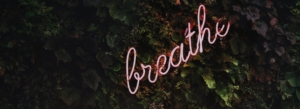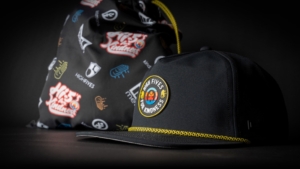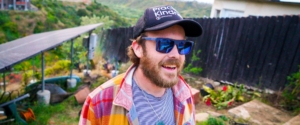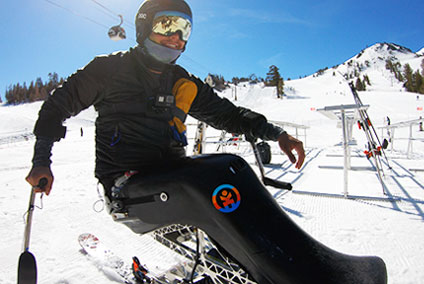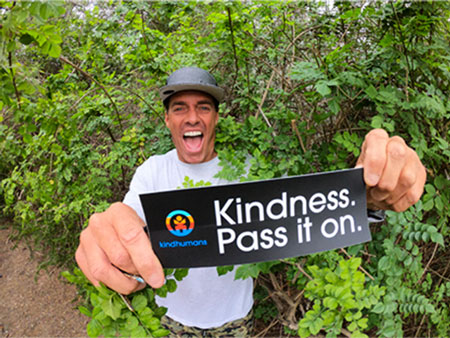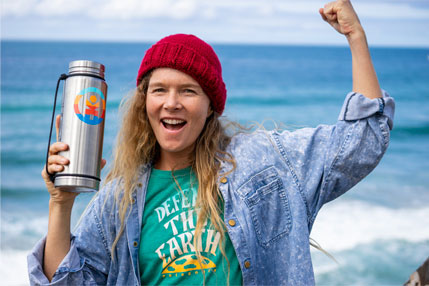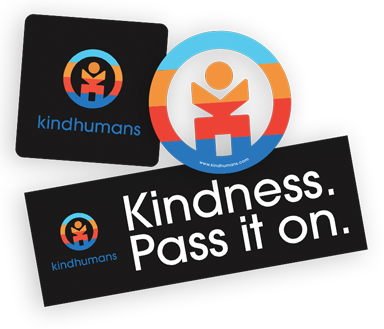
Kindhumans Profile: A few kind questions with Cliff Kapono
Kindhumans ProfilesKindhumans Profile: A few kind questions with Cliff Kapono
Our friend and Kindhumans contributor Evan Luth sat down with professional surfer, chemist, and journalist Cliff Kapono to talk about surfing, science, his latest ventures, and defying stereotypes. All photos by Dan Lorch. Enjoy! – KH
Despite working closely with well-known surf brands, Cliff Kapono has regularly strayed from the conventional paths of what would be considered “in-line” with the modern surf industry. Frequently enjoying surf sessions aboard traditional Polynesian wave crafts and keeping heavily involved with his local community, Cliff is a world traveler who remains highly attuned to his native culture. Whether he aims to or not, Cliff often serves as a positive ambassador and steward of the people, stories, and wisdom intrinsic to his Hawaiian heritage. Through these qualities, his general demeanor, and his pursuit of high-level scientific research, Cliff defies a multitude of stereotypes about what it means to be a surfer.
Regardless of his impressive talent as a waterman and wave rider of all kinds, Cliff has always heeded a deeper and more dutiful calling – to take care of the Earth and those around him – subsequently becoming one of the few professional surfers to receive recognition for his talents in the water and laboratory alike. It may be a bit grandiose to say, but in my opinion, Cliff represents what is becoming a new kind of archetype for “the surfer,” exemplifying an emergent and building groundswell within surfing’s culture towards greater stewardship and kindness while still embracing the wild spirit of the sea.
With a recently earned Ph.D. in Biochemistry from the University of California San Diego under his belt, Cliff is now back in his island home of Hilo, Hawaii. From this home base, he continues to conduct further research and contribute to peer-reviewed publications in the field of molecular bioscience, while chasing whatever storm systems arise around the globe. Be those cognitive waves of inspiration, environmental movements, or deep water swell lines that eclipse the horizon on their march to shore, Cliff Kopono is tuned in to the shifting tides.
With all that he has going on professionally, he still generates the space and time to come up with creative projects that speak to his broader values and vision. While he has contributed to a variety of notable film projects that help stimulate engaging conversation and stoke the flame of sustainability, his most recent and exciting endeavor comes in the form of a YouTube series aptly named “Cliff Notes.” The Cliff Notes series features a wide variety of captivating individuals who, in their own way, are finding and creating ways to leave their environment better than they found it. Through the storytelling and insights contained in each episode, Cliff Notes offers the viewer a unique perspective on some of “the most unconventional ways to protect the planet.”
I continuously look to Cliff’s writings, YouTube series, and research work as a kind of “primary source” guide when trying to better understand the status of global environmental affairs and what role the everyday citizen, like myself, does – or can – play in it. Sitting at home in Oregon, I caught up with Cliff on his way to a research project on the other side of the globe, to discuss his recent projects and his views on the relationship between being a scientist and a “kind human.”
E: To get us started, I want to congratulate you on creating your online YouTube series “Cliff Notes.” The show is centered around you traveling outside the lineup, so to speak, to share unconventional and unassuming ways that people are improving our planet. I don’t think I’m alone when I say that the spectrum of crises facing our planet and local communities can feel very overwhelming and daunting, at times even stifling or suppressing my motivations and optimism. Alternatively, I find that the “Cliff Notes” episodes offer a unique and exceptional portrayal of humble and inspirational individuals, who are doing something, big or small, to contribute in a positive way to their surroundings and impact on this planet. To me it’s a breath of fresh air in the existing conversations about what we as individuals can do, that is within our means, and yet meaningful nonetheless. I’m curious about what inspired you to create this project and how you imagine its utility in contributing constructive dialog to the much broader topics of environmentalism and sustainability?
C: Mahalo Ev! Yea I’m really stoked to be doing the Cliff Notes series. Vissla actually came to me asking if I could take audiences on a little bit of a vlog journey. I feel a little uncomfortable thinking that my life is all that interesting, so I asked them if they would be open to me highlighting other people instead. They were into it. Save the Waves Coalition is also a sponsor of the series. It’s pretty much just trying to make eco-warriors seem relatable. We don’t all have to give up driving, eating meat, or using plastic, but if we can find cool stories about people who are improving their communities, then maybe we might just be better ourselves. I feel the goal is to make this world better. How you choose to do it is completely up to you!

Photos: Dan Lorch
E: As someone who aligns with a variety of categorical identifiers, be it scientist, journalist, surfer, or otherwise, in my opinion you seem to be someone who transcends all of those titles while being uniquely positioned. Because of that variety, you’ve become a highly influential steward, teacher, and role model for many different groups of people around the world. How do you see yourself advancing scientific research and articulating those research findings in a way that allows the community at large to better understand the data, and in turn, become well-informed members of the broader discussions that need to be had?
C: I feel that science is a rad way to communicate with people. It’s like a language that can help normally distant individuals interact with each other. I don’t feel you have to agree with what I’m saying, but if science can help you understand where I’m coming from, then I’m good with that. Also, I feel that by in large, society has forgotten where to get credible information. Most of our “news” comes from our feed on social media. These sources for information are usually unchecked and anecdotal at best. Primary literature (science journals) is usually a good way to get information because they are reviewed by experts before they are published. This process gives rigor to the information established and helps to bring some sense of security to the reader. There are definitely problems with peer review journals, but by in large, I feel more confident reading a journal article from Science Magazine than I do some politician’s twitter account.
E: Several years ago you made a decision to move to California from Hawaii to participate in the Ph.D. program at UCSD. What motivated you initially to leave your home in the islands in order to pursue further academic and scientific research abroad? What did you imagine it would be like then, and looking back on it now, how did that experience impact your life?
C: It was a difficult decision to leave my island, but I felt that it was necessary to gain validation from the outside. I dealt with some insecurities about not being worth very much and looked to other places for those validations. One of them being a university like the University of California. I showed some interest in their chemistry program back in 2011 and they ended up asking me to come out and visit the campus. I went through a recruitment process and ended up deciding to attend. At the time, I wasn’t sure if it was the best choice, but having an opportunity to get a degree on UCSD’s dime was more than I was getting anywhere else, even in Hawaii. Living in SD was one of the hardest, but most rewarding, experiences so far in my life. I battled depression, loneliness, and self-doubt the entire 6 years I was living up there. Without some incredible individuals in my life, while I was there, I probably would have never found it back home. Thinking back at it, if I never returned home right after, I probably wouldn’t have remembered how to find myself again.
E: As someone who reflects deeply on the meaning of words and the impact that our understanding of language has on individuals and cultures, what does “kindness” mean to you personally?
C: Kindness to me is a gift. I have been shown so much kindness by so many people across this planet. From being given banana bread on airplanes by random elderly people to giving me a place to sleep when I had nowhere else to go. It’s infectious. After experiencing so much of it and knowing how amazing it feels to be given kindness, I just want to give it to others. The cool thing about kindness is that it doesn’t necessarily need to be given back to the person who gave it to you. You can give it to random people and it still feels good. Personally, it’s the best gift anyone can give.

Photo: Dan Lorch
E: I’m curious about how you see kindness playing a role in the trajectory of scientific advancement? Do you think that it can serve as a supportive compliment and or antidote to our seemingly endless hunger for innovation? Moreover, can kindness help us in determining the most important or valuable technologies and instruments for our planet?
C: I think that science is very cold. Scientists try to be as objective as possible and kindness doesn’t seem to fit into the formula all that often. I think that scientific research would benefit tremendously from adding a little bit more kindness into their methodology. I’m not really sure how well it will be received, but I do know that positive results are always easier to find when positive research is underway.
E: If you could think of one person, alive or dead, that has shown you kindness, who would that be why?
C: Someone who always has been kind to be is my good friend Brandan Ahuna. He is a lifeguard and woodcrafter in Hilo. He just so happens to be one of the most respected watermen on our island. He kind of just took me under his wing right around the end of high school and has been such a positive mentor, role model, and friend. He really helped me find confidence as I transitioned into adulthood. Brandan gives kindness to everyone he knows. He as truly a gift in our community and someone I aspire to.
Author Profile:
 Evan was born and raised in Solana Beach, California, and recently relocated to Bend, Oregon for a change of pace. Evan’s passion for wild nature, creativity, people, and the immersive beauty and wonder of the direct and present experience has lead him where he is today. His strong commitment to the service of others has made him determined to apply consciously evolving strategies and perspectives to his life and work.
Evan was born and raised in Solana Beach, California, and recently relocated to Bend, Oregon for a change of pace. Evan’s passion for wild nature, creativity, people, and the immersive beauty and wonder of the direct and present experience has lead him where he is today. His strong commitment to the service of others has made him determined to apply consciously evolving strategies and perspectives to his life and work.
“I believe that kindness is part and parcel with human consciousness. It is both intrinsic to our nature and yet is a gift that is continually bestowed upon us. While nature can at times be unforgiving and red in tooth and claw, the human determination towards kindness is one of our ways of revealing and sharing the latent grace and serenity of the universe. Stoking the flame of awe and wonder, kindness is one of the most valuable resources we can share and should be treated as such.”


